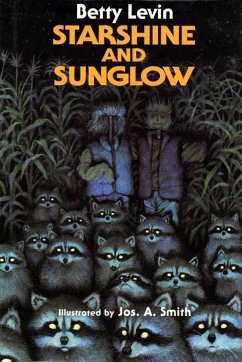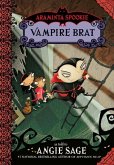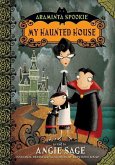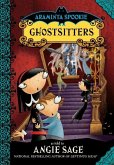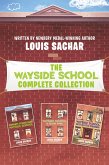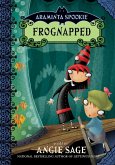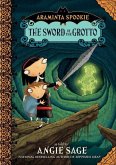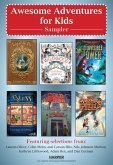4,99 €
4,99 €
inkl. MwSt.
Sofort per Download lieferbar

0 °P sammeln
4,99 €
Als Download kaufen

4,99 €
inkl. MwSt.
Sofort per Download lieferbar

0 °P sammeln
Jetzt verschenken
Alle Infos zum eBook verschenken
4,99 €
inkl. MwSt.
Sofort per Download lieferbar
Alle Infos zum eBook verschenken

0 °P sammeln
- Format: ePub
- Merkliste
- Auf die Merkliste
- Bewerten Bewerten
- Teilen
- Produkt teilen
- Produkterinnerung
- Produkterinnerung

Bitte loggen Sie sich zunächst in Ihr Kundenkonto ein oder registrieren Sie sich bei
bücher.de, um das eBook-Abo tolino select nutzen zu können.
Hier können Sie sich einloggen
Hier können Sie sich einloggen
Sie sind bereits eingeloggt. Klicken Sie auf 2. tolino select Abo, um fortzufahren.

Bitte loggen Sie sich zunächst in Ihr Kundenkonto ein oder registrieren Sie sich bei bücher.de, um das eBook-Abo tolino select nutzen zu können.
Ben, Kate, and Foster create two super scarecrows to protect Mrs. Flint's corn crop from the animals that feed on it, but soon the scarecrows seem to take on a life of their own.
- Geräte: eReader
- mit Kopierschutz
- eBook Hilfe
- Größe: 4.05MB
- FamilySharing(5)
Andere Kunden interessierten sich auch für
![Araminta Spookie 4: Vampire Brat (eBook, ePUB) Araminta Spookie 4: Vampire Brat (eBook, ePUB)]() Angie SageAraminta Spookie 4: Vampire Brat (eBook, ePUB)3,99 €
Angie SageAraminta Spookie 4: Vampire Brat (eBook, ePUB)3,99 €![Araminta Spookie 1: My Haunted House (eBook, ePUB) Araminta Spookie 1: My Haunted House (eBook, ePUB)]() Angie SageAraminta Spookie 1: My Haunted House (eBook, ePUB)3,39 €
Angie SageAraminta Spookie 1: My Haunted House (eBook, ePUB)3,39 €![Araminta Spookie 5: Ghostsitters (eBook, ePUB) Araminta Spookie 5: Ghostsitters (eBook, ePUB)]() Angie SageAraminta Spookie 5: Ghostsitters (eBook, ePUB)3,99 €
Angie SageAraminta Spookie 5: Ghostsitters (eBook, ePUB)3,99 €![Wayside School 3-Book Collection (eBook, ePUB) Wayside School 3-Book Collection (eBook, ePUB)]() Louis SacharWayside School 3-Book Collection (eBook, ePUB)12,56 €
Louis SacharWayside School 3-Book Collection (eBook, ePUB)12,56 €![Araminta Spookie 3: Frognapped (eBook, ePUB) Araminta Spookie 3: Frognapped (eBook, ePUB)]() Angie SageAraminta Spookie 3: Frognapped (eBook, ePUB)3,99 €
Angie SageAraminta Spookie 3: Frognapped (eBook, ePUB)3,99 €![Araminta Spookie 2: The Sword in the Grotto (eBook, ePUB) Araminta Spookie 2: The Sword in the Grotto (eBook, ePUB)]() Angie SageAraminta Spookie 2: The Sword in the Grotto (eBook, ePUB)3,39 €
Angie SageAraminta Spookie 2: The Sword in the Grotto (eBook, ePUB)3,39 €![Awesome Adventures for Kids Middle Grade Sampler (eBook, ePUB) Awesome Adventures for Kids Middle Grade Sampler (eBook, ePUB)]() VariousAwesome Adventures for Kids Middle Grade Sampler (eBook, ePUB)0,00 €
VariousAwesome Adventures for Kids Middle Grade Sampler (eBook, ePUB)0,00 €-
-
-
Ben, Kate, and Foster create two super scarecrows to protect Mrs. Flint's corn crop from the animals that feed on it, but soon the scarecrows seem to take on a life of their own.
Dieser Download kann aus rechtlichen Gründen nur mit Rechnungsadresse in A, B, BG, CY, CZ, D, DK, EW, E, FIN, F, GR, HR, H, I, LT, L, LR, M, NL, PL, P, R, S, SLO, SK ausgeliefert werden.
Produktdetails
- Produktdetails
- Verlag: HarperCollins
- Altersempfehlung: ab 8 Jahre
- Erscheinungstermin: 26. Oktober 2010
- Englisch
- ISBN-13: 9780062035615
- Artikelnr.: 38005784
- Verlag: HarperCollins
- Altersempfehlung: ab 8 Jahre
- Erscheinungstermin: 26. Oktober 2010
- Englisch
- ISBN-13: 9780062035615
- Artikelnr.: 38005784
- Herstellerkennzeichnung Die Herstellerinformationen sind derzeit nicht verfügbar.
Betty Levin is the author of many popular books for young people, including The Banished; Look Back, Moss; Away to Me, Moss; Island Bound; Fire in the Wind; and The Trouble with Gramary. Betty Levin has a sheep farm in Lincoln, Massachusetts, where she also raises and trains sheepdogs.
"I started writing stories almost as soon as I began to read. They were derivative and predictable-as much a way of revisiting characters and places in books I loved as it was a means of self-expression. I don't remember when words and their use became important. In the beginning was the story, and for a long time it was all that mattered.
"Even though I always wrote, I imagined becoming an explorer or an animal trainer. This was long before I had to be gainfully employed. It wasn't until after I'd landed in the workplace, first in museum research and then in teaching, that I returned to story writing-this time for my young children. Then a fellowship in creative writing at the Bunting Institute of Radcliffe College gave me and my storymaking a chance. One affirmation led to another, and now there are books-and some readers.
"When I talk with children in schools and libraries, I realize that child readers are still out there. When they get excited about a character or a scene, a new dimension opens for them, a new way of seeing and feeling and understanding.
"Of course there is always one child who asks how it feels to be famous and to be recognized in supermarkets. I explain that the only people who recognize me are those who have seen me working my sheep dogs or selling my wool at sheep fairs. That response often prompts another query: Why write books if they don't make you rich and famous? I usually toss that question back at the children. Why do they invent stories? How does story writing make them feel?
"Eventually we explore the distinction between wanting to be a writer and needing to write. If we want to write, then we must and will. Whether or not we become published authors, we all have tales to tell and stories to share. Literature can only continue to grow from the roots of our collective experience if children understand that they are born creative and that all humans are myth users and storytellers."
In Her Own Words...
"I started writing stories almost as soon as I began to read. They were derivative and predictable-as much a way of revisiting characters and places in books I loved as it was a means of self-expression. I don't remember when words and their use became important. In the beginning was the story, and for a long time it was all that mattered.
"Even though I always wrote, I imagined becoming an explorer or an animal trainer. This was long before I had to be gainfully employed. It wasn't until after I'd landed in the workplace, first in museum research and then in teaching, that I returned to story writing-this time for my young children. Then a fellowship in creative writing at the Bunting Institute of Radcliffe College gave me and my storymaking a chance. One affirmation led to another, and now there are books-and some readers.
"When I talk with children in schools and libraries, I realize that child readers are still out there. When they get excited about a character or a scene, a new dimension opens for them, a new way of seeing and feeling and understanding.
"Of course there is always one child who asks how it feels to be famous and to be recognized in supermarkets. I explain that the only people who recognize me are those who have seen me working my sheep dogs or selling my wool at sheep fairs. That response often prompts another query: Why write books if they don't make you rich and famous? I usually toss that question back at the children. Why do they invent stories? How does story writing make them feel?
"Eventually we explore the distinction between wanting to be a writer and needing to write. If we want to write, then we must and will. Whether or not we become published authors, we all have tales to tell and stories to share. Literature can only continue to grow from the roots of our collective experience if children understand that they are born creative and that all humans are myth users and storytellers."
